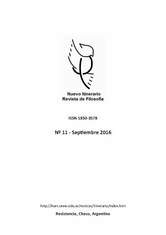Kant and the teleology of nature: on the aim of nature in Idea for a universal history with a cosmopolitan aim and the guarantee of nature in Toward perpetual peace
DOI:
https://doi.org/10.30972/nvt.1725717Keywords:
Kant, teleology, natureAbstract
In Idea for a universal history in cosmopolitan intention (1784), Kant presents the concept of an intention of nature that gives meaning and purpose to the history of humanity. The concept of this intention is a regulative idea of theoretical reason, and is then grounded by the doctrine of these ideas presented by Kant in his Critique of Pure Reason. The purpose of nature for the human being is the complete development of human dispositions, especially the rational one. As these dispositions are developed maximally within the framework of a just civil constitution, and as the establishment of this constitution would be useless if there were a situation of war between the different States, it becomes necessary to institute a confederation of them, possessing a coercive power, to legally settle conflicts. In Toward perpetual peace (1795), on the other hand, Kant presents the concept of a guarantee of nature for the asymptotic approach of the human being toward a condition of perpetual peace. The political form of this condition is that of a voluntary confederation of States without constitution or coercive power. The aforementioned guarantee of nature is not of a theoretical character, but of a practical character, because its function is not to provide knowledge, but to support the moral purpose of realizing the idea of perpetual peace asymptotically. This guarantee of nature is based on the teleological doctrine of nature set forth in the Critique of the power of judgment. The objective of this article is to present in detail the differences and similarities between the two teleological conceptions of nature that we have just outlined.
References
Allison, H. E. (2004). Kant’s Transcendental Idealism. Revised and Enlarged Edition. New Haven/London: Yale University Press.
Allison, H. E. (2009). Teleology and history in Kant: the critical foundations of Kant’s philosophy of history. En A. Oksenberg Rorty y J. Schmidt (comps.), Kant’s Idea for a Universal History with a Cosmopolitan Aim. A Critical Guide (pp. 24-45). Cambridge: Cambridge University Press.
Ameriks, K. (2009). The purposive development of human capacities. En A. Oksenberg Rorty y J. Schmidt (comps.), Kant’s Idea for a Universal History with a Cosmopolitan Aim. A Critical Guide (pp. 46-67). Cambridge: Cambridge University Press.
Caranti, L. (2014). The Guarantee of Perpetual Peace: Three Concerns. En P. Formosa, A. Goldman y T. Patrone (comps.), Politics and Teleology in Kant (pp. 145-162). Cardiff: University of Wales Press.
Fiegle, T. (2014). Teleology in Kant’s Philosophy of History and Political Philosophy. En P. Formosa, A. Goldman y T. Patrone (comps.), Politics and Teleology in Kant (pp. 163-179). Cardiff: University of Wales Press.
Flikschuh, K. (2006). Reason and Nature: Kant’s Teleological Argument in Perpetual Peace. En G. Bird (comp.), A Companion to Kant (pp. 383-396). Oxford/Malden: Blackwell Publishing.
Hoesch, M. (2015). Garantie. En M. Willaschek, J. Stolzenberg, G. Mohr y S. Bacin, (comps.), Kant-Lexikon (pp. 669-670). Berlin: De Gruyter.
Höffe, O. (1992). “Even a Nation of Devils Needs the State”: the Dilemma of Natural Justice”. En H. Williams (comp.), Essays on Kant’s Political Philosophy (pp. 120-142). Cardiff: University of Wales Press.
Kant, I. (1900ss.). Kant’s gesammelte Schriften. Edición de Deutsche (anteriormente Königlich Preußische) Akademie der Wissenschaften. Berlin y otros: Walter de Gruyter y predecesores [Akademie-Ausgabe = AA].
Kant, I. (1981). La religión dentro de los límites de la mera razón. (F. Martínez Marzoa, Trad.). Madrid: Alianza. [RGV].
Kant, I. (1996). Sobre la paz perpetua. (Joaquín Abellán, Trad.). Madrid: Tecnos. [ZeF]
Kant, I. (2003). Crítica del discernimiento. (R. R. Aramayo y S. Mas, Trad.). Mínimo Tránsito: Madrid. [KU].
Kant, I. (2009). Crítica de la razón pura. (M. Caimi, Trad.). México D. F.: Fondo de Cultura Económica. [KrV].
Kant, I. (2011). Crítica de la razón práctica. (D. M. Granja Castro, Trad.). México D. F.: Fondo de Cultura Económica. [KpV].
Kant, I. (2013a): Contestación a la pregunta: ¿Qué es la ilustración? (R. R. Aramayo, Trad.). En R. R. Aramayo (comp.), ¿Qué es la Ilustración? Y otros escritos de ética, política y filosofía de la historia (pp. 85-98). Madrid: Alianza. [WA].
Kant, I. (2013b): Idea para una historia universal en clave cosmopolita (R. R. Aramayo y C. Roldán Panadero, Trad.). En R. R. Aramayo (comp.), ¿Qué es la Ilustración? Y otros escritos de ética, política y filosofía de la historia (pp. 99-125). Madrid: Alianza. [IaG].
Kleingeld, P. (2004). Approaching Perpetual Peace: Kant’s Defence of a League of States and his Ideal of a World Federation. European Journal of Philosophy, 12(3), 304-325. Doi: https://doi.org/10.1111/j.0966-8373.2004.00212.x
Kleingeld, P. (2008). Kant on historiography and the use of regulative ideas. Studies in History and Philosophy of Science, 39(4), 523-528. Doi: https://doi.org/10.1016/j.shpsa.2008.09.006
Kleingeld, P. (2009). Kant’s changing cosmopolitanism. En A. Oksenberg Rorty y J. Schmidt (comps.), Kant’s Idea for a Universal History with a Cosmopolitan Aim. A Critical Guide (pp. 171-186). Cambridge: Cambridge University Press.
Louden, R. B. (2014). Cosmopolitical unity: the final destiny of the human species. En A. Cohen (comp.), Kant’s Lectures on Anthropology. A Critical Guide (pp. 211-229). Cambridge: Cambridge University Press.
Shell, S. (2015). Anlage. En M. Willaschek, J. Stolzenberg, G. Mohr y S. Bacin (comps.), Kant-Lexikon (pp. 96-97). Berlin: De Gruyter.
Vaki, F. (2014). What Are We Allowed to Hope? Kant’s Philosophy of History as Political Philosophy. En P. Formosa, A. Goldman y T. Patrone (comps.), Politics and Teleology in Kant (pp. 194-210). Cardiff: University of Wales Press.
Williams, H. (1983). Kant’s Political Philosophy. Oxford: Basic Blackwell.
Wood, A. W. (2006). Kant’s Philosophy of History. En P. Kleingeld (comp.), Immanuel Kant. Toward Perpetual Peace and Other Writings on Politics, Peace, and History (pp. 243-262). New Haven/London: Yale University Press.
Wood, A. W. (2009). Kant’s Fourth Proposition: the unsociable sociability of human nature. En A. Oksenberg Rorty y J. Schmidt (comps.), Kant’s Idea for a Universal History with a Cosmopolitan Aim. A Critical Guide (pp. 112-128). Cambridge: Cambridge University Press.
Zocher, R. (1958). Zu Kants transzendentaler Deduktion der Ideen der reinen Vernunft. Zeitschrift für philosophische Forschung, 12(1), 43-58.
Downloads
Published
How to Cite
Issue
Section
License
Les autores ceden a Nuevo Itinerario los derechos de publicidad de sus trabajos, toda vez que hayan sido admitidos como parte de alguno de sus números. Ello no obstante, les autores retienen los derechos de propiedad intelectual y responsabilidad ética así como la posibilidad de dar difusión propia por los medios que consideren.












51.jpg)

